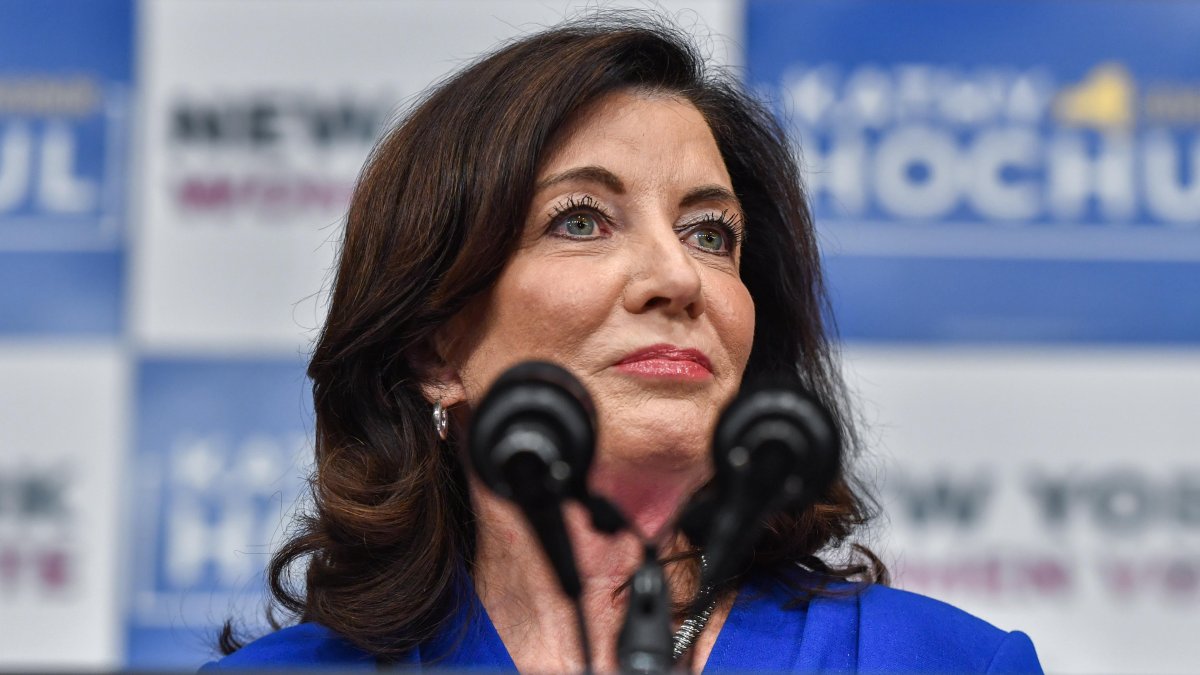NEW YORK — On Thursday, Kathy Hochul announced a conceptual agreement for New York’s budget for fiscal year 2024. The Governor called the budget “bold and transformative” that will lead to a safer, more affordable and more livable.
Hochul detailed the announcement shortly after 8 p.m., with a thread on Twitter.
He first tackled the living spaces that New Yorkers face. While he mentioned that New Yorkers deserve safe communities, he worked to make that a reality by strengthening bail laws and investing in gun violence prevention.
Other budget highlights, according to the governor’s office, include:
- Invest $1 billion in mental health, the biggest investment in comprehensive mental health care in a generation, and transform the continuum of care by increasing inpatient psychiatric treatment capacity, dramatically expanding outpatient services and increasing insurance coverage.
- Creating a stronger health care system for the future with an additional $1 billion in health care capital funding and expanding Medicaid coverage to more than 7.8 million New Yorkers low income.
- Protect reproductive health care by investing $100.7 million to fund abortion providers, expand access to abortion care for SUNY and CUNY students, provide access to over-the-counter contraceptives at pharmacies, enact additional data protections for patients seeking reproductive health care and increase Medicaid reimbursement rates for abortion care.
- Record funding for P-12 schools and higher education, including highest annual amount of school aid of $34.5 billion, full Foundation Aid funding for the first time ever, reauthorization of 22 charter schools, including 14 in New York City York, and $2.4 billion for new capital projects for SUNY and CUNY.
- Implement comprehensive new programs to ensure affordable, high-quality child care, including $500 million for a Workforce Retention Grant Program and $25 million to support the Employer Child Care Tax Credit and the expansion of the Child Tax Credit to include children under four.
- Raising the minimum wage for three years, after which the state minimum wage would increase at a rate determined by the Consumer Price Index for Urban Wages and Office Workers (CPI-W), giving hundreds of thousands of New Yorkers earning minimum wage an increase in wages to meet the rising cost of living.
- Support tenants, including public and subsidized housing residents, with rent arrears through a significant investment in housing assistance for the New York City Housing Authority and other public housing residents, as well as Section 8 voucher recipients and other residents of subsidized housing through the Emergency Rent Assistance Program (ERAP).
- Save the MTA from the “tax cliff” and ensure long-term stability by adjusting the Payroll Mobility Tax for New York City’s largest corporations to 0.6%, generating approximately . $1.1 billion; $300 million in one-time state aid; demand that New York City contribute $165 million to fund on-demand transportation services; $65 million to reduce the proposed rate increase on the MTA; increasing service frequencies on the subway and launching a pilot program that offers five free bus routes in New York to improve the customer experience.
- Fight climate change and invest in energy affordability by implementing the nation’s first zero-emissions requirements for new building construction and expanding the capacity of the New York Power Authority to support New York’s climate goals. York.
- Make New York a more competitive place to create jobs and fuel economic growth by expanding and enhancing the New York Movie Tax Credit, one of the nation’s most stable film production incentive programs, which will boost the New York film industry. one of the largest union employers in the state.
- Construction of infrastructure and capital projects across the state, including $1.7 billion for a new Department of Health research lab, $2.4 billion for transformation, maintenance and maintenance at SUNY and CUNY campuses statewide, $446 million for phase three of the Hunts Point Interstate Access Improvement Project, $105 million to upgrade the emergency operations center at the State, $51 million for the rehabilitation and replacement of the Hudson Valley Bridge, and much more.
- Support New Yorkers with disabilities by expanding the Medicaid Purchase Program for Working People with Disabilities, funding and revitalizing the Interagency Coordinating Council for Services to the Deaf, DeafBlind, and Hard of Hearing, and increasing the number of 55-B service section civilian positions increase the representation of persons with disabilities in the state workforce.
- Expand access to and increase demand for New York food and produce while supporting farmers by increasing food manufacturing capacity in the state; $10 million to support the creation of farmers’ markets, supermarkets and food cooperatives in underserved communities; and $50 million over five years to local school districts to support New York State products in school-aged children’s meals in K-12.
- Expand the enforcement powers of the Office of Cannabis Management and the Department of Taxation and Finance to further develop the legal cannabis market, including by imposing fines on illegal retail operations and closing such stores.
- Support New York City’s seniors by funding statewide programs to support aging in place and address financial abuse, elder abuse, and senior isolation, and increase funding Blueprint for Aging (MPA), a comprehensive, interagency vision for older adults living in New York State.
With a conceptual agreement in place, the legislative chambers should pass bills that will enact these priorities.
The total budget for fiscal year 2024 is currently estimated at $229 billion, based on a preliminary assessment of the negotiated changes to the executive’s proposal.
The approved budget will keep state operating fund spending below 3% in fiscal year 2024 and increase state reserves to a record 15%, as proposed by the governor in during the first months of his administration.

